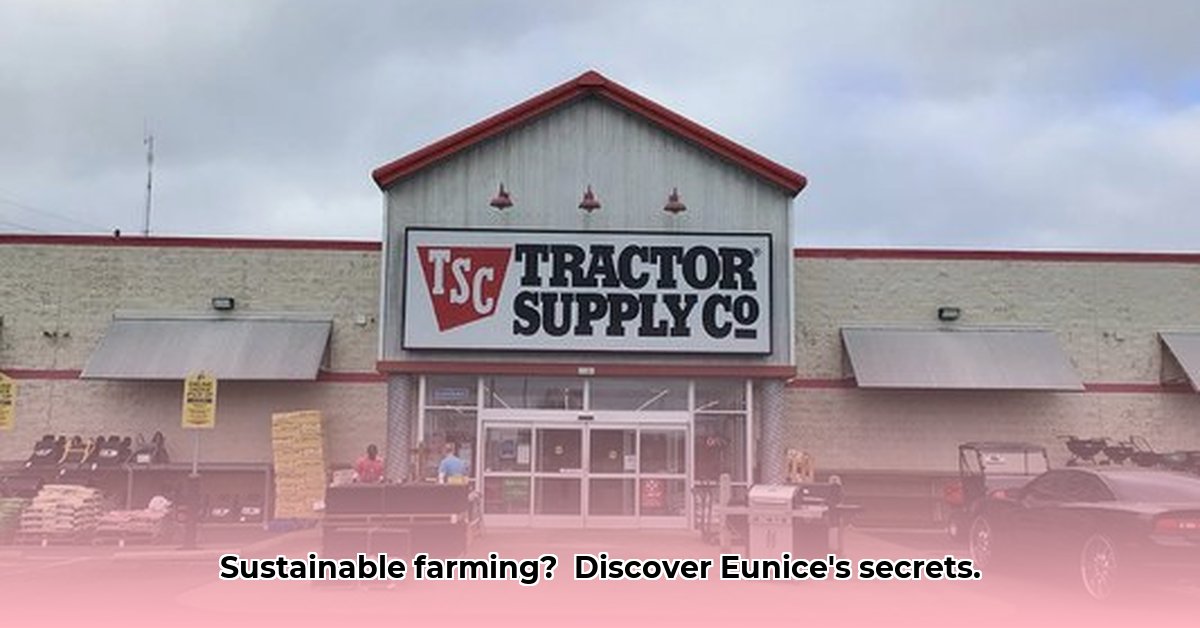
Is Easy Access Enough for Sustainable Farming?
Eunice Tractor Supply (ETS) offers Louisiana farmers convenient access to agricultural supplies, potentially reducing transportation needs and fuel consumption. This could indirectly lead to more sustainable farming practices by lowering carbon emissions. However, is convenient access sufficient to label ETS a champion of sustainable agriculture? The answer requires a deeper examination of their practices and product offerings. While reduced travel is a positive, it's just one piece of a much larger puzzle. Does the reduced environmental impact from less travel outweigh any negative impacts of their operations? This remains unproven. For more information on agricultural sustainability initiatives, see this resource.
The Big Question: What's ETS Really Doing for Sustainability?
Currently, a significant lack of transparent information hinders our assessment of ETS's commitment to environmental responsibility. Critical questions remain unanswered:
Product Portfolio Transparency: What percentage of ETS's products are organic or environmentally friendly? A detailed inventory analysis is essential to determine the actual proportion of sustainable options compared to conventional products. This is a crucial aspect of evaluating their overall impact. How much of those products meet industry standards for sustainability? The lack of available data presents a significant roadblock in drawing meaningful conclusions.
Supply Chain Sustainability: Where do ETS's products originate? What are the environmental impacts throughout their supply chain, from production to transportation and distribution? Rigorous supply chain audits are vital to understand their overall footprint. Are they sourcing from suppliers who demonstrate their own commitment to sustainable practices? This is not readily apparent.
Farmer Perspectives: What is the firsthand experience of local farmers who utilize ETS? Do they find the sustainable options they need readily available, or do they find themselves falling short? Direct feedback from farmers is essential in obtaining a complete and balanced perspective about actual sustainability outcomes.
This lack of data prevents definitive conclusions about ETS's role in promoting sustainable agriculture. We lack the pieces of the puzzle to fully analyze their actual impact.
Getting to the Bottom of It: A Roadmap for Investigation
To address the current knowledge gaps, the following steps are crucial:
Comprehensive Product Inventory Analysis: A detailed inventory of ETS's stock, analyzing both the quantity and diversity of sustainable versus conventional products. This quantitative analysis is necessary to assess the true availability of eco-friendly options.
Rigorous Supply Chain Audits: Thorough investigations into ETS's supply chain, tracing products back to their origins, evaluating transportation methods, and assessing waste management protocols at every stage. This process will provide insights into the environmental consequences of their operations.
Farmer Focus Groups and Surveys: Engaging with local farmers through focus groups and surveys to gather firsthand accounts of their experiences with available sustainable supplies and overall satisfaction.
Benchmarking Against Competitors: Comparing ETS's sustainability practices and product offerings to those of its competitors in the agricultural retail sector. This will provide a comparative context for evaluating their performance.
Who's Responsible? A Collaborative Effort
Successful resolution requires a collaborative approach from various stakeholders:
| Stakeholder | Short-Term Actions | Long-Term Actions |
|---|---|---|
| Local Farmers | Provide direct feedback to ETS staff; explore alternative retailers with stronger sustainability profiles. | Advocate for increased sustainable product selection at ETS and support businesses with demonstrable environmental commitments. |
| ETS Staff | Actively solicit and document farmer feedback about needed sustainable products. | Propose and implement initiatives promoting sustainable agriculture within the store and broader community. |
| ETS Corporate | Commission an independent audit of all locations' sustainability practices. | Develop and publicly release a comprehensive sustainability plan for all locations, including clear, measurable targets and timelines. |
| Louisiana Department of Agriculture and Forestry (LDAF) | Foster collaboration between ETS and local farmers. | Offer incentives and support for businesses adopting sustainable practices. |
The Bottom Line: Potential Untapped
ETS possesses the potential for significant contributions to sustainable agriculture in the Eunice area. However, this potential remains unproven due to the lack of verifiable data. The research steps outlined above are crucial for moving beyond speculation to a thorough understanding of their actual environmental impact. Transparency and collaboration are essential to fully assess ETS's role in shaping a more sustainable agricultural future. The current situation necessitates further investigation to determine whether ETS's claims align with reality.